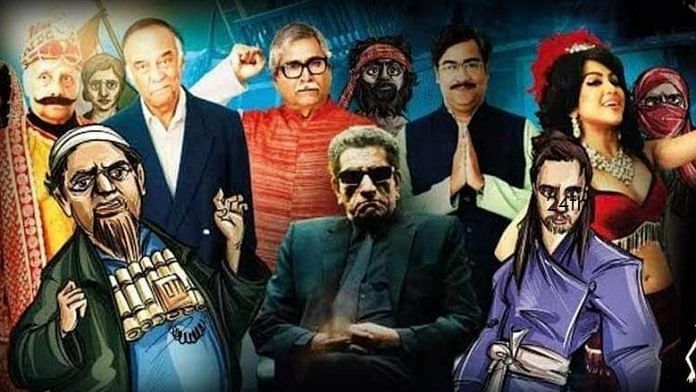New Delhi: The Supreme Court Thursday pulled up the state of West Bengal and restrained it from using any “extra-constitutional” means to prevent the screening of the satirical film Bhobishyoter Bhoot.
The verdict, pronounced by Justice D.Y. Chandrachud and Justice Hemant Gupta, further imposed costs and directed the state to pay Rs 20 lakh as compensation to the filmmakers. The state will also bear the cost of the court proceedings to the tune of Rs 1 lakh, the court ruled.
“In the present case, we are of the view that there has been an unconstitutional attempt to invade the fundamental rights of the producers, the actors and the audience. Worse still, by making an example out of them, there has been an attempt to silence criticism and critique,” the court observed.
The verdict is an important one on the issue of freedom of speech, and ThePrint reproduces some key extracts from the judgment.
State suppression
“The police are not in a free society the self-appointed guardians of public morality. The uniformed authority of their force is subject to the rule of law.
“Such attempts (when a film is unceremoniously pulled out) are insidious and pose a grave danger to personal liberty and to free speech and expression. They are insidious because they are not backed by the authority of law. They pose grave dangers to free speech because the citizen is left in the lurch without being informed of the causes or the basis of the action.
“We have no manner of doubt that this was a clear abuse of public power” (when a letter addressed by INOX to the producer specifically mentions that they were directed by the authorities to discontinue the screening in the ‘interest of the guests’).
“The police are entrusted with enforcing law. In the present case, the West Bengal police have overreached their statutory powers and have become instruments in a concerted attempt to silence speech, suborn views critical of prevailing cultures and threaten law abiding citizens into submission.”
Also read: SC fines West Bengal govt Rs 20 lakh for ban on satirical film Bhobishyoter Bhoot
Growing intolerance
“Contemporary events reveal that there is a growing intolerance: intolerance which is unaccepting of the rights of others in society to freely espouse their views and to portray them in print, in the theatre or in the celluloid media.
“Organised groups and interests pose a serious danger to the existence of the right to free speech and expression.
“The true purpose of art, as manifest in its myriad forms, is to question and provoke…In questioning prevailing social values and popular cultures, every art form seeks to espouse a vision. Underlying the vision of the artist is a desire to find a new meaning for existence.
“The artist, in an effort to do so, is entitled to the fullest liberty and freedom to critique and criticise.”
“Satire and irony are willing allies of the quest to entertain while at the same time to lead to self-reflection… Art is as much for the mainstream as it is for the margins.
“The state does not entrust freedoms to the people: the freedoms which the Constitution recognises are inseparable from our existence as human beings.
“The views of the writer of a play, the metre of a poet or the sketches of a cartoonist may not be palatable to those who are criticised. Those who disagree have a simple expedient: of not watching a film, not turning the pages of the book or not hearing what is not music to their ears.
“The Constitution does not permit those in authority who disagree to crush the freedom of others to believe, think and express.
“When the ability to portray art in any form is subject to extra constitutional authority, there is a grave danger that fundamental human freedoms will be imperilled by a cloud of opacity and arbitrary state behaviour.”
The state’s duty
“In the space reserved for the free exercise of speech and expression, the state cannot look askance when organised interests threaten the existence of freedom. The state is duty bound to ensure the prevalence of conditions in which of those freedoms can be exercised.
“When organised interests threaten the properties of theatre owners or the viewing audience with reprisals, it is the plain duty of the state to ensure that speech is not silenced by the fear of the mob.
“Unless we were to read a positive obligation on the state to create and maintain conditions in which the freedoms guaranteed by the Constitution can be exercised, there is a real danger that art and literature would become victims of intolerance.”
Also read: Supreme Court asks CBI for update on trial of Sajjan Kumar in 1984 anti-Sikh riots case




So what do our limousine liberals and champagne socialists have to say about their darling Didi? Can we expect the award wapsi gang and the legion of letter writers to condemn Mamata Banerjee? If they don’t, clearly all that that wrote and talked against Shri Narendra Modi and his government was sheer hypocrisy.
it is good to see the SC protecting freedom of speech – it has failed miserably elsewhere – not only in terms of freedom of speech – freedom itself – and many other freedoms guaranteed by the constitution